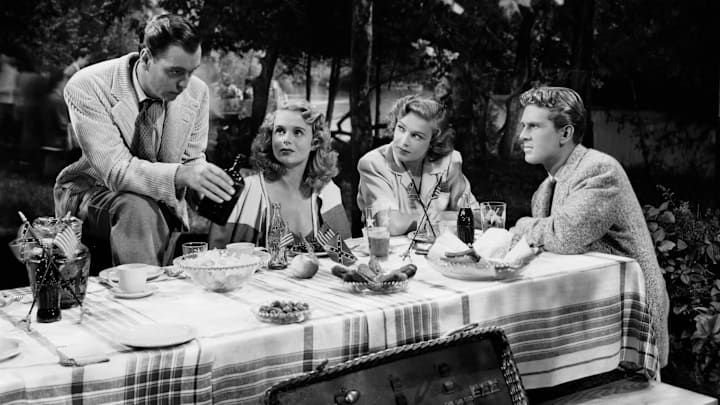It’s far from Summer here currently in the United States, but with the cold weather, your mind might turn to warmer climes, and the days of going outside and having a picnic. But before you do, you might want to know where the word picnic comes from – and why it’s taken on racist connotations in more modern times.
Basically, like most words, there’s the etymology of the word, the strict dictionary definition, and then how the word has been used. English: it’s a complicated language! We’d say “it’s no picnic” but you’ll understand why that’s no joking matter by the end of this article.
Picnic: what does the word mean?
Look, you probably know what the word picnic means, but we can break it down anyway. Not to get all high school essay, but Webster’s dictionary defines the word picnic in a few different ways:
- An excursion or outing with food usually provided by members of the group and eaten in the open.
- A pleasant or amusingly carefree experience; an easy task or feat.
- A shoulder of pork with much of the butt removed.
Honestly, I did not know about the pork shoulder thing, and I have some questions about how a pig has its shoulder and butt connected, but that’s a question for a different time.
Those are all the noun definitions, but it can also be a verb, aka “to go on a picnic.”
That’s all well and good, but where did the word come from?
What is the origin of the word picnic? The etymology is up for debate

There’s actually a bit of a debate about the first usage of the word picnic: was it French, or German? Most sources I looked at quote the French origin of the word, pique-nique, which is a portmanteau of the verb “piquer” and the word “nique.”
Though piquer has multiple translations, the one used here could be bite, pick, peck, or nab, potentially. As for nique, it has a wider variety of translations, including "nothing at all" and "a child’s tooth." However, in the modern era, it’s used far more frequently as a slang word that in English starts with the letter “f” and rhymes with “duck.”
Is it possible the word “picnic” started as a reference to a quick, er, duck? Perhaps. However, the first reference to the word was in a burlesque verse from 1649 that included a character named Brother Pique-Nique, who attacked his food with gusto.
It was later adopted in 1694 as a shared meal outside. And according to the book The Picnic: A History, which was published in 2014, in English we started using it as a reference to a meal held outdoors some time during the 19th century.
It is possible, though, that the word has an entirely different, or parallel etymology, as it may also come from the German word picknick. Which seems possible, since they’re basically the same word. The world may never know!
Why is the word picnic considered racist?
Particularly during what is now called the Summer of Racial Reckoning, when crowds of protestors gathered to fight back against police after the murders of George Floyd and Breonna Taylor, a rumor started spreading online that if you used the word picnic, you were being racist, because the word has racist origins.
As we’ve shown above, as far as history is concerned that’s not necessarily how the word started. However, it is what the word became, at least in some parts of America in the late 1800s and early 1900s.
A described by Reuters, white mobs would gather in a festive atmosphere to watch black men, women, and children get lynched. They quote a project of the Equal Justice Initiative titled “Lynching in America” which says, “white men, women, and children present watched the horrific murders while enjoying deviled eggs, lemonade, and whiskey in a picnic-like atmosphere.”
So while the word picnic did not start with racist connotations, as far as we’re aware, it did gather that interpretation over time. Words grow and change and gather meaning as history continues, as you can plainly see even from the original derivation of the word picnic. So in the modern era, it’s worth evaluating whether using the word, with all the horrific feelings it might evoke, is something you want to do.
Got questions about history, trivia, or anything else? Send an email to askeverest@fansided.com and we might answer here on the site!
